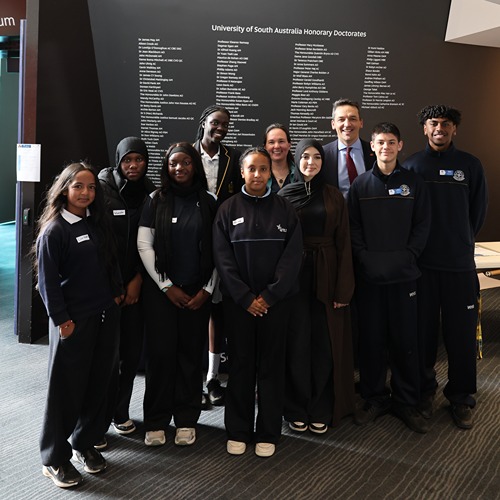11 November 2025

New research into racism in South Australian schools highlights clear, consistent frameworks support safer, more inclusive school communities.
Findings from the study were presented yesterday at the University of South Australia’s Anti-Racism in Schools symposium, attended by Education Minister Blair Boyer, policy makers from the Department for Education and Catholic Education SA, and students and teachers from six South Australian schools.
The findings stem from a two-year research project led by UniSA’s Associate Professor Melanie Baak, undertaken at a highly multicultural school (which is anonymous for research confidentiality) in Adelaide’s northern suburbs. Funded by the Montebello Foundation, the project aimed to respond to and prevent racism in schools, with the participating school seeing significant improvements in student wellbeing and belonging.
Associate Professor Baak says collaboration between researchers, schools, and education authorities is key to building consistent, evidence-based responses.
“The research highlights the value of a coordinated, system-wide approach that supports schools with clear expectations, guidance and resources,” she says.
“The establishment of the Coalition for Anti-Racism in Education (CARE) network as part of this project has shown how powerful collective action can be, bringing together more than ten South Australian schools committed to addressing racism. Our findings recommend a state-level framework and dedicated departmental expertise to help create truly safe and inclusive learning environments.”
Associate Professor Baak says Australian research consistently shows that schools are the most common setting where young people experience racism, with alarming rates of incidents reported nationwide.
“Our research and existing national data tell us that racism is not rare, it’s part of many students’ everyday reality,” she says.
“At the research school site, 80 per cent of students had witnessed or experienced racism more than once in the past year, nearly half said they encountered it weekly, and one in four reported experiencing racism daily. That frequency was linked to a lower sense of belonging at school.”
Students who were unsure what racism actually is were also less likely to report it, highlighting the need for clearer education, awareness and action across schools. While New South Wales and Victoria have Department for Education anti-racism policies that outline expectations and response procedures, other states including South Australia are still exploring how best to ensure consistent and informed approaches across all schools.
“In the absence of a state-level policy, our research school took the initiative to develop its own anti-racism framework,” Associate Professor Baak says.
“This involved creating a clear reporting process for racist incidents and a restorative approach that centres care on both the person who experienced racism and the person who engaged in it.
“The school also introduced classroom content focused on understanding racism, intercultural awareness, and the strengths of Australia’s cultural diversity, where the whole school approach celebrates the community’s diversity and identity.”
A year after implementing the anti-racism policy and procedures, the school recorded encouraging progress. Two-thirds of students reported improvements in how the school responds to racist incidents and their own skills to speak out against racism, and there was a seven per cent reduction in the number of students regularly experiencing racism.
The Department for Education’s Wellbeing and Engagement Survey for the school showed notable gains between 2023 and 2025, including a six per cent rise in positive perceptions of school climate, an 11 per cent increase in students reporting a high sense of school belonging, and a six per cent increase in peer belonging.
“This is ongoing work,” Associate Professor Baak says. “Changing school culture takes time, and continued evaluation is essential to ensure the initiatives benefit both staff and students in the long term.”
A leader at the research school says the project proved how important it is to have a clear response plan to racism.
“Having a focus on cultural inclusion at our school over the past three years has meant that there has been space to think and reflect as a staff about how our students are impacted by racism, and how our response as a school staff can really make a difference,” they say.
“Before, we didn’t have a clear process for reporting and responding to racism. Developing that has been a definite improvement.”
A teacher at the research school says the project has fostered stronger connection within the school community.
“Alongside our anti-racism work, students relish the opportunity to celebrate not only their own cultural backgrounds, but the cultures of others too, all of which has helped foster belonging and connection in our community,” they say.
The project builds on nearly two decades of research for Associate Professor Baak on examining racism and belonging in education, with more than ten of her research projects exploring its impact on students from migrant and refugee backgrounds, Aboriginal and Torres Strait Islander students, and others not racialised white.
“It’s concerning just how complex it is to address racism at a school level, where the types of racism that occurs is constantly evolving, and without clear information available, staff are often underprepared to respond effectively,” Associate Professor Baak says.
“My research has consistently shown that racism affects academic outcomes, mental health, and school completion rates. The new project offers unique insights into the long-term approaches involved in both developing school policy and initiatives as well as mapping the change across time.”
The symposium was attended by students from Craigmore High School, Nazareth Catholic College, Parafield Gardens High School, Salisbury East High School, Swallowcliffe Primary School and Woodville High School.
…………………………………………………………………………………………………………………………
Media contacts:
Associate Professor Melanie Baak, UniSA Education Futures. P: 08 8302 6265. E: melanie.baak@unisa.edu.au
Lara Pacillo, Communications Officer, UniSA Media. M: +61 403 659 154. E: lara.pacillo@unisa.edu.au




